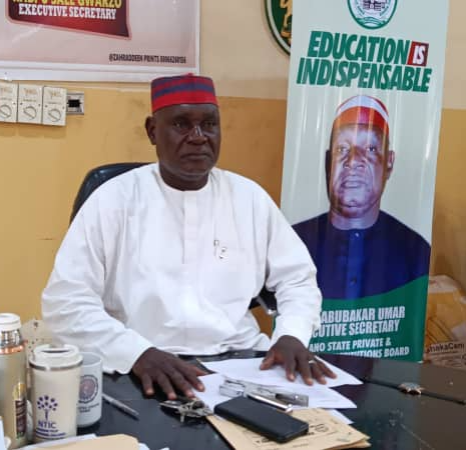By Caleb Jacob
The Kano State Government has prohibited private and voluntary schools from arbitrarily increasing tuition fees, warning that no institution will be allowed to make adjustments without formal approval.
This was unveiled by the Special Adviser to Governor Abba Kabir Yusuf on Private and Voluntary Institutions, Baba Abubakar Umarat, at a press conference in Kano on Thursday.
Umar unveiled new strict guidelines requiring schools to convene Parent-Teacher Association (PTA) meetings before proposing any fee hike.
He said such meetings must include parents, teachers, and government representatives, with decisions approved by a two-thirds majority and cleared by the state board before implementation.
“No school is allowed to increase fees without receiving formal approval from this board, no matter how big that school is,” Umar declared.
READ ALSO: Kano Schools Failing To Provide Quality Education For Children – UNICEF
The school, according to him, must convene a PTA general meeting with representatives of the Private Institutions Department or any duly appointed agency and the state PTA in attendance.
A copy of the minutes of the PTA meeting to the Private Institutions Board or any agency assigned to the State PTA office, duly signed by the PTA Chairman and Secretary, respectively.
Umar also urged parents to pay their fees promptly and take PTA meetings seriously, describing non-attendance as “negative behaviour” that undermines accountability.
According to him, “It is only when you pay your school fee that the school can manage the school.”
Reacting to parents’ attitudes toward PTA meetings, he noted that “you cannot have a child in a school, and the school will ask you to come for constructive and positive dialogue, and you refuse to come.”
The state government has also banned compulsory charges such as book and uniform purchases, extra lessons, development levies, security fees, and payments for prize-giving ceremonies.
Umar reiterated that parents are entitled to freely purchase the above items either in the schools or elsewhere.
READ ALSO: Kano Govt Urges School Registration, Begins Standards Enforcement
Added to the list of non-compulsory charges were co-curricular activities charges, testimonial/certificate charges, and others.
Mr. Umar stressed that only curriculum activities approved by the government and consistent with Kano’s cultural and religious standards will be allowed.
Beyond fees, the government warned that unregistered and substandard schools risk closure and prosecution.
Umar said many voluntary schools have ignored repeated directives to obtain operational certificates, adding that some operate in dilapidated structures with unqualified teachers.
“If you don’t have the operational certificate, we will take you to court,” he warned, noting that prosecutions would be handled with the Ministry of Justice and anti-corruption agencies, without regard to a school’s size or influence.
Reacting to claims by school owners that high taxes force them to raise fees, Umar revealed that no institution has paid more than 4 percent of tuition as tax, despite a legal requirement of 10 percent.
He said the government had shown leniency because of economic realities, dismissing the operators’ justification as baseless.
READ ALSO: FG Bars Schools Without Certified Teachers From Hosting Exams
He further disclosed that the 2014 law guiding private schools in Kano is under review to close loopholes and strengthen regulation.
Private School Owners React
Meanwhile, some private school owners in attendance acknowledged the state government’s leniency regarding the 10 percent tax on tuition fees.
The heads also corroborated the allegations of schools operating illegally and some in dilapidated buildings.
Mr. Ibrahim Aya, Principal of Hamadiyya College, agreed that no school in the state has complied with the 10 percent tax due to economic realities.
Aya, while acknowledging the law governing the school fees increase, appreciated the state government for considering current economic realities in tax collection.
READ ALSO: FG Bars Schools Without Certified Teachers From Hosting Exams
Citing parents’ lack of capacity to pay tuition fees promptly due to the harsh economy, Aya said no private school in Kano has been able to comply with up to 4% of the required tuition tax.
“Really, no school is paying a complete 10%. We have to thank Alhaji Baba; whatever they ask us to pay, we just pay,” said Principal Aya.
Abdulkadir Abubakar, who represented another private school, said his school adhered to the regulation on increasing school fees, including the signing of the school register.
Abubakar, however, described the move by the state government as “fair.”

